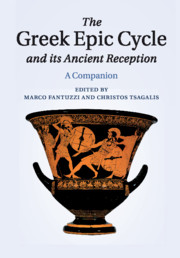Book contents
- Frontmatter
- Contents
- List of illustrations
- List of contributors
- Editorial note
- Introduction: Kyklos, the Epic Cycle and Cyclic poetry
- PART I APPROACHES TO THE EPIC CYCLE
- PART II EPICS
- 11 Theogony and Titanomachy
- 12 Oedipodea
- 13 Thebaid
- 14 Epigonoi
- 15 Alcmeonis
- 16 Cypria
- 17 Aethiopis
- 18 Ilias parva
- 19 Iliou persis
- 20 Nostoi
- 21 Telegony
- PART III THE FORTUNE OF THE EPIC CYCLE IN THE ANCIENT WORLD
- Works cited
- Index of principal passages
- Index nominum et rerum
19 - Iliou persis
from PART II - EPICS
Published online by Cambridge University Press: 05 August 2015
- Frontmatter
- Contents
- List of illustrations
- List of contributors
- Editorial note
- Introduction: Kyklos, the Epic Cycle and Cyclic poetry
- PART I APPROACHES TO THE EPIC CYCLE
- PART II EPICS
- 11 Theogony and Titanomachy
- 12 Oedipodea
- 13 Thebaid
- 14 Epigonoi
- 15 Alcmeonis
- 16 Cypria
- 17 Aethiopis
- 18 Ilias parva
- 19 Iliou persis
- 20 Nostoi
- 21 Telegony
- PART III THE FORTUNE OF THE EPIC CYCLE IN THE ANCIENT WORLD
- Works cited
- Index of principal passages
- Index nominum et rerum
Summary
The myth in poetry and art
For as long as the Trojan War was the subject of Greek song, the sack of that city must have provided bards with some of their most memorable poetry. The recovery of Helen required the destruction of an ancient and mighty city, with dramatic consequences for victors and vanquished. The Greeks won great glory, but their impiety during the sack tainted that achievement, and led to many warriors experiencing a perilous or even fatal return. The Trojans suffered annihilation: their men killed, their women enslaved. Yet a group led by Aeneas escaped destruction and propagated the Trojan race. The events of such a momentous night cry out for poetic treatment. Yet in what survives of classical literature, the earliest extended narrative of the sack is owed to…Publius Vergilius Maro, in the second book of the Aeneid. For earlier periods, mere fragments remain.
The first extant poems which deal with the Trojan saga are set respectively before and after the fall of Troy. The Iliad, which describes events in the tenth and final year of the siege, conspicuously fails to pursue its narrative as far as the destruction of the city. Hector is sure that the sack will take place; indeed, his death will be its proximate cause. But the epic ends not with the sack, but with his funeral. The poet's decision to stop short of what seems a more obvious terminus springs from his concentration on a single theme: the anger of Achilles, its consequences and resolution. Adding a narrative of the sack of Troy would have seriously unbalanced the work, preventing the poet from giving prominence to the profound meeting between Achilles and Priam. More generally, accounts of the sack were no doubt already familiar when the Iliad was being composed; Homer decides to fashion his poem from less obvious material. In his hands, the low-key encounter between two enemies forms a more moving ending than the sack could ever have been.
The Odyssey is the first extant poem to narrate the destruction of Troy. The gods brought about the sack of the city, Alcinous tells Odysseus, so that it would be a subject of song among men.
- Type
- Chapter
- Information
- The Greek Epic Cycle and its Ancient ReceptionA Companion, pp. 344 - 354Publisher: Cambridge University PressPrint publication year: 2015
- 2
- Cited by

